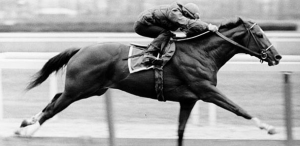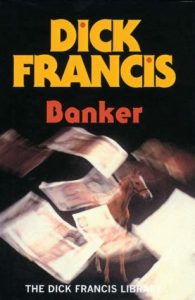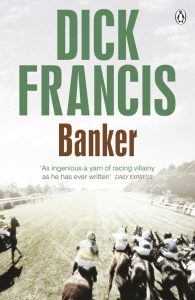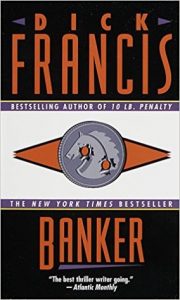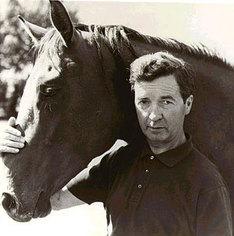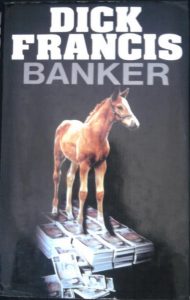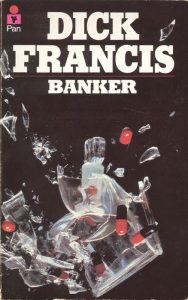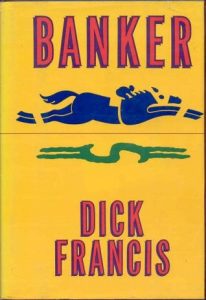Banker is Dick Francis’ 22nd crime novel in a total of 42. This book, written in 1982, features English investment banker Tim Ekaterin as the amateur detective. When Tim approves a five million pound loan to buy star racehorse Sandcastle for breeding purposes, he is putting a lot on the line, but the potential profit for the bank where he is employed outweighs the risks. He becomes suspicious when the resulting foals are born have inexplicable birth defects and decides to start investigating. Determined to uncover the truth, Tim puts himself in danger in order to find out if he is being sabotaged. Despite his inexperience, Tim handles the case well, relying on his instincts, working hard to restore security for the bank and his own job though the investigation becomes more sinister the further he delves into it, with several people turning up dead.
Tim Ekaterin is relatively young, somewhere between his late 20’s to his 30’s, and determined to prove himself. In the first of the three sections in the book, Tim moves up from his apprenticeship at the investment banking firm founded by his great-grandfather, and becomes responsible for approving and declining loans due to the temporary disability of his boss. Tim is sort of an unheroic type of man, and becomes involved in the investigation in order to ensure he didn’t make a fatal mistake by approving such a large, risky loan. He copes with many different kinds of challenges: professional, of course, because he approved the loan; emotional, as he wrestles with his lustful feelings for his boss’ wife; and physical as he struggles to keep up in the investigation. He makes some friends along the way, like the horse healer Calder Jackson and pharmacologist Penelope Warren, and with their help he begins to fit the pieces together. His relationship with Penelope is interesting because she is both single and a suitable age for Tim, but Francis focuses only on her pharmaceutical expertise. In some ways, Penny is an intellectual equal for Tim, though she is still rather two-dimensional.
Though I was concerned when Banker was first assigned that I would find it dull because of the elements of horse racing and investment banking, I thought it was engaging and couldn’t seem to put the book down. Francis created a fantastic blend of action, equestrian topics, banking, pharmaceuticals, and sentiment. There were other minor plots included, like Tim’s relationship with Judith, his colleague’s wife, or even him working his way up the corporate ladder at the beginning, which never detracted from the main storyline, but instead were supplementary. Additionally, even though the story spanned a three year period, plot was compelling and moved along at a healthy pace. Banker certainly fills the role of a crime thriller with its inclusion of deceptions, murders, and sabotage.
Unlike a majority of other authors in the mystery genre, Dick Francis did not have a recurring detective that appeared in all of his works. While others, like Agatha Christie, relied on a large quantity of books featuring the same detective to win the hearts of the readers, Francis created a unique protagonist for each story, with the exception of Sid Halley and Kit Fielding who each made a multiple appearances. This also means that we get all of the character development in one story, which is fascinating. In series detectives, it is pretty typical that information be revealed throughout the series, instead of all in the first book. As for his stories themselves, critics questioned the veracity of his depictions of the racing world, not believing that it could possibly be as corrupt and twisted, but it is undeniable that art imitates life and vise versa.1 Another significant critical insight comes from enotes, which helped place Banker in the tradition:
“Whereas in traditional whodunits, the detective is a man or woman of keen insight whose perception outpaces his or her accumulation of facts and proof, Banker’s Tim Ekaterin is a novice whose progress toward the resolution is even more tentative than the reader’s.”1
As someone who has not read any other novels by Dick Francis, I can’t say whether or not Banker is superior in comparison to the others. From what I’ve gathered, all of Francis’ books are set against a general theme of horse racing because of his expertise and background in the subject; growing up Francis wanted to be a jockey and eventually became champion jockey of England.5 Though some may think this would lead to unavoidable predictability, there is always a new element/influence to be found in the detective. Of his more than 40 international best-sellers, who’s to say which book should be read over another?
I can say that I would give Banker a rating of 7.5/10. Of course there were moments in its 308 pages that I thought were a little dull or even had to reread a passage or two to make sure I really understand what was happening, but overall I found the novel to be entertaining. I understand that some of the themes in the book might not be for everyone, but that is exactly how I felt when first approaching it. It is definitely not just for investment bankers and jockeys; there are elements that can appeal to anyone. I truly enjoyed reading Banker and would recommend it to anyone who enjoys a solid mystery.
Shop local to support small businesses. Here is a link to help you find your local independent bookstore: https://www.indiebound.org/indie-bookstore-finder
Bibliography, Links, and Additional Resources:
1. “Banker Analysis.” Enotes.com, Enotes.com, www.enotes.com/topics/banker.
2. “Banker Book Summary and Study Guide.” All Readers, allreaders.com/book-review-summary/banker-24365.3.
3. “BANKER by Dick Francis.” Kirkus Reviews, www.kirkusreviews.com/book-reviews/dick-francis/banker/.
4. “Dick Francis.” Wikipedia, Wikimedia Foundation, 24 Nov. 2017, en.wikipedia.org/wiki/Dick_Francis.
5. “Dick Francis’ Horse Racing Thriller Mysteries.” MysteryNet.com, www.mysterynet.com/books/testimony/francis-horse-racing/.
6. Reynolds, Stanley. “Dick Francis Obituary.” The Guardian, Guardian News and Media, 14 Feb. 2010, www.theguardian.com/sport/2010/feb/14/dick-francis-obituary.


